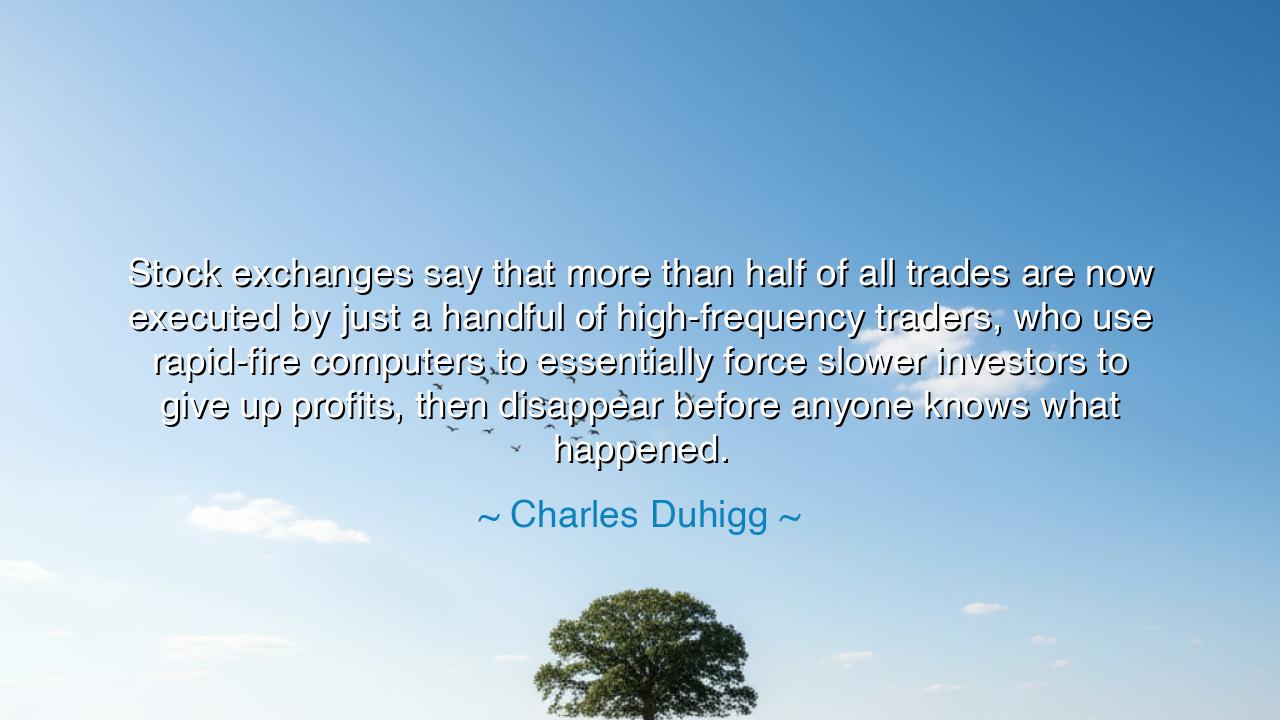
Stock exchanges say that more than half of all trades are now
Stock exchanges say that more than half of all trades are now executed by just a handful of high-frequency traders, who use rapid-fire computers to essentially force slower investors to give up profits, then disappear before anyone knows what happened.






In the heart of the modern marketplace, where numbers move faster than thought and fortunes rise and fall in the blink of an eye, Charles Duhigg unveiled a truth both sobering and profound: “Stock exchanges say that more than half of all trades are now executed by just a handful of high-frequency traders, who use rapid-fire computers to essentially force slower investors to give up profits, then disappear before anyone knows what happened.” These words, though wrapped in the language of finance, speak to something greater — to the very soul of power, speed, and human greed. For what Duhigg describes is not merely a method of trading, but a symbol of how technology, unmoored from ethics, becomes an instrument of unseen domination.
To understand the depth of this statement, one must first know its origin. In the early years of the twenty-first century, the world’s financial markets underwent a transformation. The trading floors once filled with shouting brokers and frantic hand signals gave way to quiet rooms filled with humming servers. The high-frequency trader replaced the human broker, and the markets — once driven by instinct, judgment, and time — became arenas of machine precision. These new traders used algorithms and computers so fast they could complete thousands of transactions in a single heartbeat. They bought and sold not to invest, but to exploit the infinitesimal flickers between prices. In their speed, they found advantage; in that advantage, they found power.
Duhigg’s warning is not only about finance — it is about imbalance. For the “rapid-fire computers” he speaks of represent more than mechanical speed; they represent the age-old struggle between those who wield superior tools and those who do not. The “slower investors,” the ordinary citizens and careful stewards of savings, become like farmers in a land where bandits move faster than sight — robbed not by brute force, but by invisibility. The machines enter the marketplace like ghosts, take what they desire, and vanish before the echo of their actions can be heard. Thus, wealth moves upward in silence, and the slower, more patient hands of human labor are left empty.
This is not a new story, though it wears new clothing. In the days of ancient Rome, there were merchants who would hoard grain during famine, waiting for hunger to raise its price; in the Industrial Revolution, magnates used steam and steel to crush craftsmen who worked by hand. So too now, the algorithmic trader wields his advantage — not in muscle or cunning, but in milliseconds. Yet the heart of the matter remains the same: whenever power grows too swift for conscience to follow, injustice blooms. The machine’s cold precision magnifies not virtue, but vice, unless it is tempered by human wisdom.
There is a tale that mirrors this truth. In the year 2010, the world’s markets experienced what was called the Flash Crash — a moment when, in the span of minutes, billions of dollars in value vanished and then returned, like a mirage dissolving into air. The cause was not war, nor fear, nor folly of men — but the automated algorithms themselves, feeding upon one another in blind, mechanical frenzy. The very system designed for profit had turned upon itself. This event, like a thunderclap, revealed the fragility beneath the glittering towers of finance. It was as though the gods of commerce had warned humanity: “You have built a temple of speed, but forgotten the altar of understanding.”
Thus, Duhigg’s words call for reflection, not despair. They remind us that speed without wisdom is chaos, and power without restraint is tyranny. Technology is neither friend nor foe; it is a mirror, reflecting the heart of its maker. When we see the markets consumed by invisible algorithms, we see not only the triumph of innovation, but the peril of forgetting that progress must serve people, not the other way around. The ancients taught that mastery of the self is greater than mastery of the world — and so it remains, even in the age of code and circuit.
So, my listener, take from this a lesson both practical and eternal. In your dealings — whether with money, machines, or men — be not seduced by the illusion of speed. What is gained in haste is often lost in purpose. Build with intention, act with integrity, and let your tools serve your wisdom, not replace it. Beware the comfort of systems that promise ease at the cost of understanding. For the true strength of humanity lies not in how quickly we act, but in how deeply we see.
For the wisdom of Charles Duhigg’s words endures beyond the market: that the partnership of man and machine must always be governed by conscience, or else the swift shall devour the slow, and the world will mistake velocity for victory. Let us remember that progress is not the art of moving faster, but of moving rightly — with eyes open, hearts awake, and justice guiding the hand.






AAdministratorAdministrator
Welcome, honored guests. Please leave a comment, we will respond soon